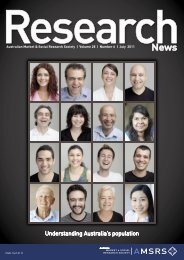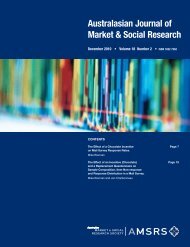Asia Pacific region - aprc-research
Asia Pacific region - aprc-research
Asia Pacific region - aprc-research
You also want an ePaper? Increase the reach of your titles
YUMPU automatically turns print PDFs into web optimized ePapers that Google loves.
FEATURE<br />
Current market <strong>research</strong><br />
awareness and usage<br />
However, in a recent survey of 200 local fast moving consumer<br />
goods (FMCG) SMEs in Ho Chi Minh and Hanoi, conducted by<br />
FTA Marketing Research, less than 30 per cent had a separate<br />
marketing department. None had a functional market <strong>research</strong><br />
department.<br />
Therefore, it is not surprising that only half of these SMEs agree<br />
that market <strong>research</strong> is the tool for understanding target consumers.<br />
Only about 45 per cent agree that market <strong>research</strong> should be<br />
the foundation for business strategy. Only 30 per cent agree that<br />
market <strong>research</strong> should be used to improve current product offers<br />
or develop new products.<br />
Fifty one per cent had never used services from a market<br />
<strong>research</strong> agency. Instead, they used mostly information from their<br />
sales force, from staff, from informal talk with consumers at point<br />
of sale or with others in the same industry. They relied on business<br />
owners’ experience and learning from trial and error.<br />
While 49 per cent reported they had tried outsourcing market<br />
<strong>research</strong> services in the past three years, nearly half were not<br />
satisfied. The top three reasons for being dissatisfied and saying<br />
they are not likely to use market <strong>research</strong> again were:<br />
1. Did not provide value for money<br />
2. Did not solve business problem (after doing the <strong>research</strong>, the<br />
owners received only general results and recommendations<br />
from <strong>research</strong> agencies that were considered as too broad, not<br />
practical and not particularly feasible to their business)<br />
3. Based on inaccurate information (as a result of inappropriate<br />
<strong>research</strong> design, from talking to the wrong target, or from not<br />
asking the right questions).<br />
Key barriers to usage<br />
The most significant barrier to <strong>research</strong> usage among SMEs in<br />
Vietnam is that it is perceived to be a cost item, not an investment.<br />
This is the result of not being able to see the benefits of <strong>research</strong>,<br />
nor seeing the linkage between market <strong>research</strong> and business<br />
success and failure.<br />
The second barrier comes from the low awareness of what<br />
<strong>research</strong> is and how it could be used. Technical <strong>research</strong> terms<br />
such as qualitative, quantitative, usage and attitudes (U&A), concept<br />
test, price sensitivity and retail audit could be hard for SMEs (with<br />
no <strong>research</strong> background, no marketing background and even no<br />
formal business training background) to understand.<br />
If market <strong>research</strong> products could be seen to help generate<br />
sales reports, consumer feedbacks reports, promotion preference<br />
reports, product rating reports and so on, then SMEs could link<br />
these to the immediate benefits of using <strong>research</strong>.<br />
The third most serious barrier is SMEs’ management vision.<br />
Usually, if the owners do not trust market <strong>research</strong> agencies (as<br />
a result of either perception or past trial experience), then this<br />
would largely result in limited resources (people to absorb and use<br />
<strong>research</strong>) and limited or no budget for <strong>research</strong>.<br />
On the other hand, agencies need to better demonstrate their<br />
ability to understand SMEs’ business, background, structure,<br />
people, and financial resources. Research products and models that<br />
are used for multinational corporations might not be appropriate<br />
in the SME sector.<br />
To be more relevant, there needs to be a shift from <strong>research</strong><br />
language to business language. Not only does the <strong>research</strong> product<br />
name need to change, but also the <strong>research</strong> tools need to be<br />
relevant to SME’s day-to-day business. These are the outcomes<br />
SMEs want to see:<br />
• Sales reports<br />
• Distribution updates<br />
• Sales intelligence<br />
• Consumption trends<br />
• Product benchmarking<br />
• Price intelligence<br />
• Promotion plan<br />
• Investment maximisation<br />
• Growth maximisation<br />
• New market / product development (associated with new<br />
risks, far away from experience and core expertise).<br />
Key drivers<br />
Among SMEs interviewed in the survey, the most important<br />
driver of market <strong>research</strong> usage was the expectation that<br />
<strong>research</strong> should clearly identify SME’s strategic direction and<br />
also how to reach the end goal – the destination. They expect<br />
to see the <strong>research</strong>er’s ability to act as a business and marketing<br />
consultant. Not only do they expect to hear ‘what to do’,<br />
they also want to hear ‘how others did’. For them, <strong>research</strong><br />
is a fact based business solution, thus <strong>research</strong> must show<br />
how it could actually solve the business problem. They expect<br />
<strong>research</strong>ers to show experience and real market validation<br />
from servicing other big multinational clients and explain how<br />
the big fishes did it.<br />
Researchers need to conduct comprehensive pre-<strong>research</strong> discussions<br />
and effectively act as an internal <strong>research</strong> department.<br />
Adoption process<br />
Key decision makers for marketing strategy and market <strong>research</strong><br />
remain the SME’s owner, the managing director and the marketing<br />
director (normally head hunted and hired from multinational<br />
companies).<br />
Over the past five years in Vietnam, many SME owners have<br />
attended practical training courses in marketing and market <strong>research</strong>.<br />
They, in turn, send their marketing staff to these courses.<br />
As a result, they are getting to know about marketing and market<br />
<strong>research</strong> concepts and services.<br />
In our recent survey with SMEs, the top source of <strong>research</strong> awareness<br />
and adoption is training. Usually, SMEs talk to the trainers for<br />
advice and also seek marketing consultant from this source.<br />
In many other SMEs, the restructuring processes to cope with<br />
growth results in the employment of experienced marketing seniors<br />
(who used to work for multinational companies) and this also facilitates<br />
the adoption of market <strong>research</strong>. These are often SMEs that<br />
sell, process and export raw materials. Now they are focusing more<br />
on domestic market, which requires serious brand building. They are<br />
seeing opportunities in the domestic growth but also seeing strong<br />
competition from multinationals. They feel the risk is high, they are<br />
now pulled out of their comfort zone and realise that relying on their<br />
own experience isn’t enough.<br />
SMEs (in particular those operating in the FMCG sector) represent<br />
an area of potentially strong growth for those operating in the<br />
Vietnamese market <strong>research</strong> industry. This segment is not easy to<br />
penetrate, with many barriers for <strong>research</strong> agencies to overcome.<br />
However, once SMEs trust and adopt <strong>research</strong>, a <strong>research</strong> agency<br />
could win a full annual <strong>research</strong> package and an exclusive deal.<br />
Tran Ngoc Dung (executive director, FTA Marketing Research)<br />
and Tuong Tuan Thong (FTA Marketing Research) will present<br />
their paper titled ‘Market <strong>research</strong> for local SMEs in less<br />
developed countries’ at ESOMAR APAC 2011. The presentation<br />
will include a case study illustrating how Vietnamese company<br />
Nutifood used market <strong>research</strong> to grow its business.<br />
Tran Ngoc Dung<br />
Tuong Tuan Thong<br />
Research News March 2011 17





